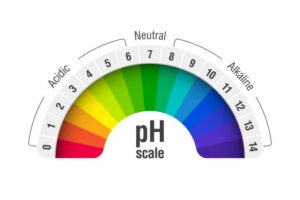
What is the Science Behind Alkaline Water pH Levels?
What is the Science Behind Alkaline Water pH Levels? In recent years, alkaline water has gained significant popularity among health-conscious individuals. With claims of numerous health benefits, this enhanced form of water has intrigued both scientists and consumers alike.
But what exactly is alkaline water, and what sets it apart from regular tap or bottled water? In this blog post, we will dive deep into the science behind alkaline water’s pH levels, unravel its potential benefits, and shed light on the ongoing research in this fascinating field.
What is pH?
pH stands for “potential of hydrogen” and is a measure of the acidity or alkalinity of a solution. It is a logarithmic scale that ranges from 0 to 14, with 7 being considered neutral. A pH value below 7 indicates acidity, while a pH value above 7 indicates alkalinity.
pH Scale and Acidic vs. Alkaline

The pH scale is logarithmic, meaning that each whole number on the scale represents a tenfold difference in acidity or alkalinity. For example, a solution with a pH of 3 is ten times more acidic than a solution with a pH of 4. Similarly, a solution with a pH of 10 is ten times more alkaline than a solution with a pH of 9. Acidic substances have a pH below 7 and tend to release hydrogen ions (H+) when dissolved in water. Examples of acidic substances include lemon juice, vinegar, and stomach acid.
On the other hand, alkaline substances have a pH above 7 and tend to release hydroxide ions (OH-) when dissolved in water. Baking soda and soap are common examples of alkaline substances.
Importance of pH Balance in the Body
Maintaining the proper pH balance is crucial for the optimal functioning of the human body. Different bodily fluids and organs have specific pH ranges that they need to maintain for proper functioning. For example:
Blood pH: The pH of blood needs to remain within a narrow range of 7.35 to 7.45 for optimal physiological functioning. Deviations from this range can lead to acidosis
- (low pH) or alkalosis (high pH), which can have detrimental effects on various bodily systems.
- Stomach pH: The stomach has a highly acidic environment, with a pH of around 2, which is necessary for the breakdown of food and activation of digestive enzymes.
- Skin pH: The skin’s pH is slightly acidic, typically ranging from 4.5 to 5.5. This acidity helps maintain the skin’s protective barrier, preventing the growth of harmful bacteria and fungi.
- Urine pH: The pH of urine can vary depending on various factors, but a slightly acidic to neutral range (around 6 to 7) is considered normal. Monitoring urine pH can provide insights into kidney function and hydration status.
An imbalance in pH levels can disrupt biological processes, affect enzyme activity, and impact overall health. While the body has natural mechanisms to regulate pH, such as the respiratory and renal systems, certain dietary and lifestyle factors can influence pH levels.
Understanding the significance of pH balance in the body sets the foundation for exploring the potential impact of alkaline water on overall health and well-being. In the following sections, we will delve into the science behind alkaline water, its pH-enhancing processes, and the potential benefits it may offer.
1. Defining Alkaline Water-:

Alkaline water refers to water that has a higher pH level than regular tap or bottled water. While regular water typically has a pH of around 7 (neutral), alkaline water typically has a pH between 8 and 9.5 or even higher.
The alkalinity of water is determined by the presence of alkaline minerals such as calcium, magnesium, potassium, and bicarbonate ions. These minerals can increase the water’s pH and give it alkaline properties. It’s important to note that alkaline water is not a new concept; natural alkaline springs and mineral-rich water sources have been used for centuries for their potential health benefits.
Natural and Artificial Ways of Obtaining Alkaline Water
There are two primary methods of obtaining alkaline water: naturally and artificially.
Natural Alkaline Water-:
Natural alkaline water is sourced from underground springs or mineral-rich water sources. As water flows through rocks and mineral deposits, it picks up alkaline minerals, increasing its pH level. Natural alkaline water is typically rich in minerals and may have additional health-enhancing properties. Examples of natural alkaline water sources include certain mountain springs and mineral springs.
Artificial Alkaline Water-:

Artificial alkaline water is produced by adding alkaline substances or undergoing processes to increase its pH. Common methods include:
Ionization: Water ionizers use an electrolysis process to separate the water into alkaline and acidic components. This process involves passing an electric current through the water, creating negatively charged ions (hydroxide ions) in the alkaline portion, increasing its pH.
Mineral additives: Alkaline water can also be created by adding alkaline minerals to regular water. These minerals, such as calcium, magnesium, and potassium, can raise the pH level of the water.
Alkaline filters: Certain filtration systems use alkaline filter cartridges or filter media to raise the pH of the water as it passes through. These filters typically contain alkaline minerals or a blend of minerals that gradually increase the water’s alkalinity.
2. Different Types of Alkaline Water-:
There are various types of alkaline water available in the market. Some common types include:
Bottled Alkaline Water: Bottled alkaline water is commercially produced and readily available in stores. It is often sourced from natural springs or treated using artificial alkalizing methods to achieve the desired pH level.
Alkaline Water Ionizers: Water ionizers are devices that can be installed at home or commercial establishments. They use electrolysis to separate water into alkaline and acidic components. The alkaline portion is consumed for its potential health benefits.
Alkaline Water Filters: Alkaline water filters are filtration systems that utilize specific filter media to increase the pH of water as it passes through. These filters are often used as attachments to faucets or integrated into water pitchers.
DIY Alkaline Water: Some people opt for do-it-yourself methods to make alkaline water at home. These methods include adding alkaline mineral drops or baking soda to regular water.
It’s important to note that the effectiveness and quality of alkaline water can vary depending on the source and method of production. It’s advisable to choose reputable brands or consult with experts to ensure the purity and reliability of the alkaline water you consume.
In the next section, we will delve into the science behind alkaline water and explore the processes that enhance its pH level and potential health benefits.
3. Ionization and Electrolysis Processes
One of the primary methods used to create alkaline water is through ionization or electrolysis. Water ionizers are devices that utilize this process. Electrolysis involves passing an electric current through the water, separating it into alkaline and acidic components.
Inside a water ionizer, there are typically two chambers separated by a membrane. The water flows through these chambers, and an electrical charge is applied to the water as it passes through the ionizer. The electrical current causes a reaction in the water, resulting in the separation of the water into alkaline and acidic streams.
The alkaline stream, also known as ionized water, contains an abundance of negatively charged ions, particularly hydroxide ions (OH-). These ions increase the pH of the water, making it more alkaline. On the other hand, the acidic stream contains positively charged hydrogen ions (H+), which contribute to its lower pH.
Alkaline Minerals and pH Enhancement
- Alkaline minerals play a significant role in enhancing the pH of water. When certain minerals are dissolved in water, they release ions that can increase the water’s alkalinity. Some common alkaline minerals found in water include calcium, magnesium, potassium, and bicarbonate.
- Water from natural alkaline sources often contains these minerals naturally. Artificial alkaline water can be created by adding these minerals directly or using alkaline filter media that gradually releases the minerals into the water as it passes through.
- It’s important to note that while alkaline minerals can increase the pH of water, the mineral content and concentration can vary depending on the source and method of production. The presence of alkaline minerals can contribute to the taste and potential health benefits associated with alkaline water.
4. ORP (Oxidation-Reduction Potential) and Antioxidant Properties
- Oxidation-reduction potential (ORP) is a measurement used to determine the presence of antioxidants or oxidants in a substance. In the context of alkaline water, ORP refers to its ability to reduce oxidative stress by neutralizing harmful free radicals in the body.
- Water with a negative ORP value is considered to have antioxidant properties, meaning it can donate electrons and neutralize free radicals. Alkaline water often exhibits a negative ORP, indicating its potential as an antioxidant.
- The antioxidant properties of alkaline water can be attributed to several factors. First, the ionization process creates negatively charged hydroxide ions (OH-), which can act as antioxidants by donating electrons to neutralize free radicals.
- Second, alkaline water derived from natural sources or enriched with alkaline minerals can contain additional antioxidants. For example, minerals like magnesium and calcium have been shown to possess antioxidant properties.
- It’s important to note that while alkaline water may have antioxidant potential, the body’s antioxidant defence system is complex, and the impact of alkaline water on overall antioxidant status is still being studied.
- In the next section, we will explore the potential health benefits associated with alkaline water, including its effects on pH balance, hydration, digestion, bone health, athletic performance, and more.
5. Balancing the Body’s pH Levels
One of the primary claims associated with alkaline water is its potential to help balance the body’s pH levels. It is believed that consuming alkaline water can counteract the effects of acidic foods and beverages, promoting a more alkaline environment in the body. However, it’s important to note that the body has natural mechanisms to regulate pH levels, and the impact of dietary interventions on overall pH balance is still a topic of ongoing research.
6. Hydration and Enhanced Absorption
Proper hydration is essential for overall health and well-being. Some proponents of alkaline water suggest that it may offer superior hydration compared to regular water due to its ability to penetrate cells more efficiently. Additionally, some studies suggest that alkaline water may enhance the absorption of water and nutrients in the body. However, more research is needed to fully understand the extent of these effects.
7. Antioxidant and Anti-Aging Effects
The presence of antioxidants in alkaline water, particularly those derived from alkaline minerals, is believed to contribute to its potential anti-ageing effects. Antioxidants help neutralize harmful free radicals in the body, reducing oxidative stress and cellular damage. While alkaline water may possess antioxidant properties, it’s important to note that the overall impact on anti-ageing effects may vary depending on various factors, including the body’s individual antioxidant defence system and lifestyle factors.
8. Digestive Health and Acid Reflux Relief
Some individuals claim that alkaline water can aid in digestive health and provide relief from acid reflux symptoms. The alkalinity of the water is believed to help neutralize excess stomach acid, reducing the discomfort associated with acid reflux. However, it’s essential to consult with a healthcare professional for personalized advice and to address underlying digestive issues.
9. Bone Health and Osteoporosis Prevention
There is some scientific interest in exploring the potential impact of alkaline water on bone health. Alkaline minerals, such as calcium and magnesium, found in certain types of alkaline water, may contribute to the maintenance of bone health. However, more research is needed to determine the direct effects of alkaline water on bone density and the prevention of conditions like osteoporosis.
10. Athletic Performance and Muscle Recovery
Proponents of alkaline water suggest that it can enhance athletic performance and aid in muscle recovery. The increased alkalinity of the water is believed to reduce lactic acid buildup and muscle fatigue during exercise. Additionally, the antioxidant potential of alkaline water may help reduce exercise-induced oxidative stress. However, the scientific evidence supporting these claims is limited, and more research is necessary to fully understand the impact of alkaline water on athletic performance and recovery.
Potential Cancer-Fighting Properties
Some studies have investigated the potential anticancer properties of alkaline water, particularly in reducing the growth and proliferation of cancer cells. However, the evidence is still preliminary, and more research is needed to establish the effectiveness of alkaline water as a standalone treatment or preventive measure against cancer. It’s crucial to approach such claims with caution and to rely on proven medical interventions for the prevention and treatment of cancer.
Alkaline Water and Cancer Cures
One of the most controversial claims surrounding alkaline water is its supposed ability to cure or prevent cancer. While some studies have explored the potential anticancer properties of alkaline water, it’s crucial to note that there is currently no scientific evidence to support the notion that alkaline water alone can cure cancer.
Cancer is a complex disease with multifactorial causes, and its treatment should be approached through proven medical interventions such as chemotherapy, radiation therapy, and surgery. It is always advisable to consult with a healthcare professional for appropriate cancer treatment and follow their recommendations.
Regulation and Safety Concerns
Another area of concern is the regulation and safety of alkaline water products. In many countries, water quality standards are in place to ensure the safety of drinking water. However, the regulations specific to alkaline water may vary. It’s important to choose reputable brands that follow proper manufacturing practices and adhere to safety guidelines.
Additionally, there have been some reports of alkaline water having an excessively high pH level, which may lead to potential health risks. Consuming highly alkaline water with a pH level above 9 or 10 can disrupt the body’s natural pH balance and may cause alkalosis, which can lead to symptoms like nausea, vomiting, muscle twitching, and confusion.
It’s essential to use caution and moderation when consuming alkaline water and consult with a healthcare professional if you have any underlying health conditions.
Balance and Moderation
Maintaining balance and moderation is key when it comes to consuming alkaline water or making any dietary changes. While alkaline water may have some potential benefits, it should not be considered a magic solution or a replacement for a healthy lifestyle. It’s important to focus on overall dietary patterns, including consuming a variety of nutrient-rich foods, staying hydrated with regular water, and engaging in regular physical activity.
Furthermore, excessive reliance on alkaline water or an overly alkaline diet may disrupt the body’s natural pH balance and affect normal bodily functions. The body has its mechanisms for regulating pH levels, and drastic alterations can potentially lead to adverse effects.
It’s important to listen to your body, pay attention to any changes or discomfort, and consult with a healthcare professional if you have any concerns. They can provide personalized guidance based on your specific health needs and circumstances.
Choosing the Right Alkaline Water Source
When incorporating alkaline water into your lifestyle, it’s important to choose the right source. Consider the following factors:
- Natural Springs: If you have access to natural alkaline springs, they can be a great option for obtaining alkaline water. Ensure that the water is from a reliable and tested source.
- Bottled Alkaline Water: If you opt for bottled alkaline water, choose reputable brands that provide information about the source and production process. Look for brands that adhere to water quality standards and have undergone proper testing.
- Water Ionizers: Water ionizers are an option for those who prefer to have an alkaline water source readily available at home. Research different models read reviews, and choose a reputable manufacturer.
- Alkaline Water Filters: Alkaline water filters can be attached to faucets or integrated into water pitchers. Look for filters that use high-quality alkaline filter media and ensure they are regularly maintained and replaced as per the manufacturer’s instructions.
DIY Methods for Alkaline Water
If you prefer a do-it-yourself approach, there are a few methods for making alkaline water at home. However, it’s important to note that these methods may not provide the same level of alkalinity or consistency as commercially available alkaline water sources. Here are a couple of DIY methods:
- Alkaline Mineral Drops: Alkaline mineral drops can be added to regular water to increase its alkalinity. These drops typically contain alkaline minerals such as magnesium, potassium, and calcium. Follow the instructions provided by the manufacturer for proper usage.
- Baking Soda: Adding a small amount of baking soda to water can raise its pH and make it more alkaline. However, it’s important to use caution and not exceed recommended amounts, as excessive consumption of baking soda can lead to health risks.
Considerations for Everyday Consumption-
When incorporating alkaline water into your everyday routine, consider the following:
- Moderation: While alkaline water may have potential benefits, it’s important to consume it in moderation. Excessive intake of alkaline water may disrupt the body’s natural pH balance and affect normal bodily functions. Balance your consumption with regular water and maintain a well-rounded diet.
- Individual Needs: Everyone’s body is unique, and what works for one person may not work for another. Consider your individual health needs and consult with a healthcare professional if you have specific concerns or conditions.
- Overall Lifestyle: Alkaline water should be seen as a part of an overall healthy lifestyle, which includes eating a balanced diet, exercising regularly, and maintaining proper hydration. It is not a standalone solution but can complement a healthy lifestyle.
- Quality and Safety: Ensure that the alkaline water source you choose follows proper safety and quality standards. Look for reputable brands, check for certifications, and read reviews from other consumers.
- Personal Preference: Lastly, consider your personal preference. Some individuals enjoy the taste and potential benefits of alkaline water, while others may not notice significant differences. Listen to your body and adjust your consumption accordingly.
Incorporating alkaline water into your lifestyle should be a conscious decision based on your individual needs and preferences. It’s important to approach it as a complement to a well-rounded healthy lifestyle and to make informed choices regarding the source and consumption of alkaline water.




Your point of view caught my eye and was very interesting. Thanks. I have a question for you.